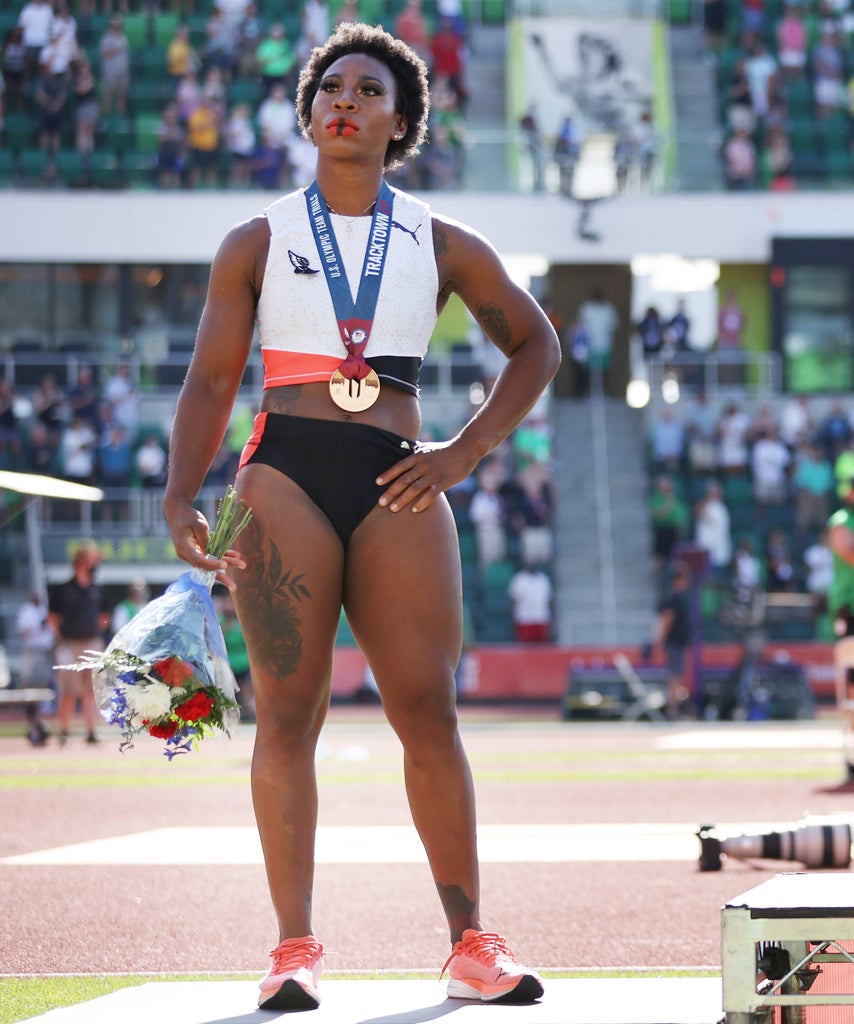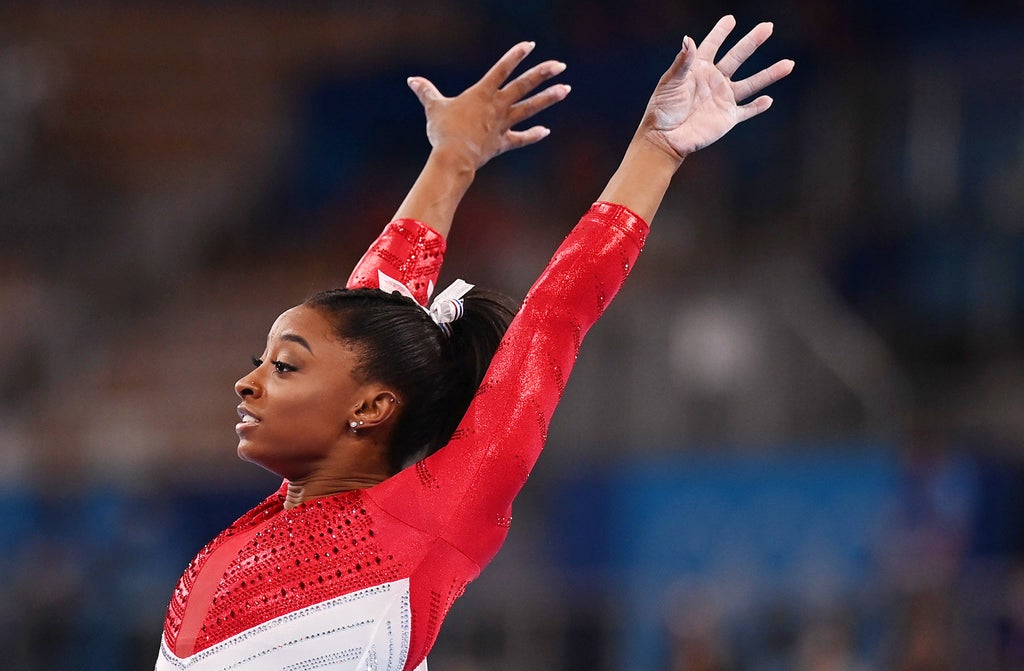
The image of hammer thrower Gwen Berry standing on a podium with her hip cocked to the side, her body turned away from her competitors and the anthem they were saluting, and her face holding an exasperated expression became an indelible example of athlete protest leading into the Tokyo 2020 Olympic games. Berry, who before this moment was unaware that the US national anthem would be played during her medal ceremony (this happened during Olympic trials last month, where unlike during the games, the anthem is typically not played), also had a black T-shirt that read “Activist Athlete” draped over her head.
Those two words together — “activist” and “athlete” — strike fear and ignorance in many so-called patriotic conservatives, insolent so-called sports fans, and in the International Olympic Committee (IOC) itself. But those two words together, and the persistent protest of athletes around the world, especially during a global event that probably shouldn’t be happening in the first place, is one of the few reasons these Olympic games are even worth paying attention to. From Berry on that podium, to Simone Biles defiantly choosing to put her mental health and well-being first, to every act of protest in between, athletes are refusing to concede to the “shut up and play” mentality that attempts to detach their athleticism from their humanity. As protests to the games itself continue outside its venues, the ones happening within Tokyo’s stadiums should be just as celebrated as gold-medal performances because these athletes are competing under impossible conditions. They are also putting their bodies and minds on the line for an institution that doesn’t seem to care about, and even exacerbates, the very issues they are protesting against.

Not all Olympic protests are created equal. During her floor routine, Costa Rican gymnast Luciana Alvarado raised her fist and took a knee in support of Black Lives Matter. Alvarado’s act, which was incorporated into her routine, is being called a “loophole” to the IOC’s rules against protesting. Originally, the organization had banned protesting altogether. After public pressure, they loosened their rules to allow athletes to “express their views,” but only within the IOC’s rigid guidelines. So, protesting on the field of play before the start of competition is OK — like the U.S. women’s soccer team kneeling before kickoff of their game against New Zealand last weekend — but what Berry did on the podium isn’t (Berry and other U.S. Olympians have signed a petition asking the IOC to allow them to demonstrate on medal podiums). Technically, Alvarado’s fist in the air during her routine isn’t allowed, but since gymnasts can essentially do whatever movements they want during floor exercises, she cannot be penalized. The rules on protesting also say that gestures need to be “consistent with the principles of Olympism,” not “targeted against ‘people, countries, [organizations] and/or their dignity,’” and not “disruptive,” according to NPR. But who gets to decide what is disruptive? The point of protest is to disrupt to bring about change. And when it comes to the IOC and the Olympics’ governing bodies, who dish out discipline disproportionately to athletes of color, it’s ironic that they get to deem what forms of protest are more “dignified” than others.
Athletes are putting their bodies and minds on the line for an institution that doesn’t seem to care about, and even exacerbates, the very issues they are protesting against.
“The IOC is seeing this from the wrong angle. They are showcasing that they don’t understand what is at stake,” says Vanessa Belleau, an equity, diversity, and inclusion strategic consultant at High Fifteen. “The IOC is thinking about this like ‘we don’t want any political views expressed’, but what is political? Black athletes are talking about their identity, themselves. We need to stop this narrative that says that our lives, as Black people in this world, are political. We are just wanting to be.”
But Black athletes don’t have the luxury of just being when they are held to different standards than their white competitors, when everything from their swim caps to their natural testosterone levels to how they choose to grieve is policed and punished. As Berry put it after the backlash to her protest was swift, America continually chooses to “rally patriotism over basic morality.“
These comments really show that:
— Gwen Berry OLY (@MzBerryThrows) June 28, 2021
1.) people in American rally patriotism over basic morality
2.) Even after the murder of George Floyd and so many others; the commercials, statements, and phony sentiments regarding black lives were just a hoax
Patriotism over morality could be the tagline of the Olympics. In the spirit of national pride and “building a better world through sport” the Olympics have consistently displaced people from their home cities, bankrupted small businesses, and increased police presence in host cities. In Tokyo, support for the Olympics is dismal for all of the reasons mentioned but also because, you know, we’re still in a global pandemic. Lisa Kwon, an organizer for NOLympics LA, a movement to keep LA from hosting the games in 2028 and to abolish the Olympics in general, says that the Olympics’ “feel-good narrative” about diversity and inclusion isn’t the reality. In fact, the Olympics’ failings tie directly to what athletes are protesting against. “Here in LA, we are anticipating 2028 but we’re reeling from the effects of 1984 which was the last time that LA hosted the Olympics,” Kwon says over the phone. “We’re still seeing the effects now of the measures and actions that were taken to beef up policing and the militarization of LAPD. After 1984, the police were heavily armed and very present and that led to the ‘92 [LA riots]. In the past year, the police budget has ballooned significantly.”
So, as athletes take a knee and raise their fists to protest police violence (which, as some people may have forgotten, was what Colin Kaepernick was protesting when he first did this gesture in the NFL in 2016), they are doing so while competing for an organization that has directly added to state violence against Black people. This hideous truth about the Olympics has always been true, but in the aftermath of George Floyd’s murder and the “racial reckoning” of last summer, it’s harder to ignore how harmful this institution is to marginalized communities — and to its athletes.
Christy Udoh, an Olympic sprinter who competed at the London 2012 games, says that athletes have to have “tunnel vision” in order to compete at this level. “As far as being Black, everything you do is always challenging,” she says. “People only want you when you’re up and when you’re down, you’re down.” Biles has been accused of letting her country down after she withdrew from the gymnastics team all-around competition (and later, the individual all-around) for reasons relating to her mental health. We know that Black rest can be a radical act of resistance. But to many pundits and Olympics fans, Biles should have taken the risk of injury and put her country over her body. How many Black bodies have America asked to do the same? How many Black women have been expected to put their heads down, perform and deliver on cue without complaint, lest they be considered “difficult” or “ungrateful”? How much gratitude is Biles supposed to show to an Olympics organization that refuses to score her death-defying acrobatics fairly? By putting her safety and sanity first, Biles staged a silent protest for all the athletes, and all the Black women, who are constantly told that their bodies belong to the state first, and themselves second.
After Berry lost endorsements and received hateful comments following her protest, she tweeted that the response proved that “Even after the murder of George Floyd and so many others; the commercials, statements, and phony sentiments regarding Black lives were just a hoax.”
Black rest can be a radical act of resistance. But to many pundits and Olympics fans, Biles should have taken the risk of injury and put her country over her body. How many Black bodies have America asked to do the same?
If the Olympics really cared about Black lives, Tommie Smith and John Carlos, the Black athletes who famously raised their fists on the medal podium at the 1968 games, would not have been expelled from the Olympics and subjected to an onslaught of racist abuse. That example holds up as proof of what the games have always been capable of, but also to show how little things have changed.
For sports fans, one of the reasons given to not completely divest from the Olympics or to not boycott the games by refusing to watch (viewership is down from five years ago) is that we need to support Black athletes. The argument is that many have been working their whole lives for a moment on the podium, or to feel the rush of bursting out of starting blocks at the Olympic games. But Kwon says the NOLympics movement is not anti-sports. “I love watching these athletes perform,” she says. “But a lot of athletes all around the world who come to compete are not benefitting. Often the people who are really winning are the media partners like NBC or other corporate sponsors while the money rarely goes directly to the athletes. There are bigger entities gaining from this and a lot of athletes have told stories after the games that they have taken on costs and put themselves near the poverty line in order to participate.”
It’s true. Unless you are one of the exceptional few who get endorsement deals and become the face of the Olympics like Biles (and even that position, especially if you are a Black woman, comes with a ton of intense pressure), it’s not like the games are incredibly lucrative for athletes. Throw in the undue racism Black athletes face from white sports fans and from the IOC, and the idea that this environment is all about the athletes and the excellence of sport becomes harder to swallow. “Some of these athletes are the greatest in their sports, the greatest ever, and despite that, they’re still being criticized, manipulated and controlled,” Belleau says. “Now they are saying ‘Enough.’”
So far during this Olympics, we’ve seen simple acts of resistance displayed against an institution that capitalizes off of Black excellence without wanting to accept the humanity that also comes with Blackness. But as more Black athletes take the podium and potentially use their platforms for more than just hollow patriotism, how will the IOC, the media and spectators react?
“But they knew the rules” is a common refrain used to stifle protest and to strip athletes of their agency. We heard it often when Sha’Carri Richardson was disqualified from the Olympics for testing positive for marijuana use (as she was grieving the death of her mother) even though soccer star Megan Rapinoe gets to promote CBD during the same games. Yes, Richardson “broke the rules,” but if the rules allow for a white male fencer accused of multiple counts of sexual assault to be protected in order for him to compete, the rules reflect what’s inherently broken within the IOC. If the rules penalize Gwen Berry for standing up for her community but reward silence and compliance in the face of oppression, maybe the rules aren’t the ones worth rooting for.
Like what you see? How about some more R29 goodness, right here?
The Olympics Don’t Care About Black Athletes
The Olympics Ban On Afro Swim Caps Is Outrageous
Simone Biles Withdraws From Team All-Around Final
from Refinery29 https://ift.tt/2WnUvC3
via IFTTT

